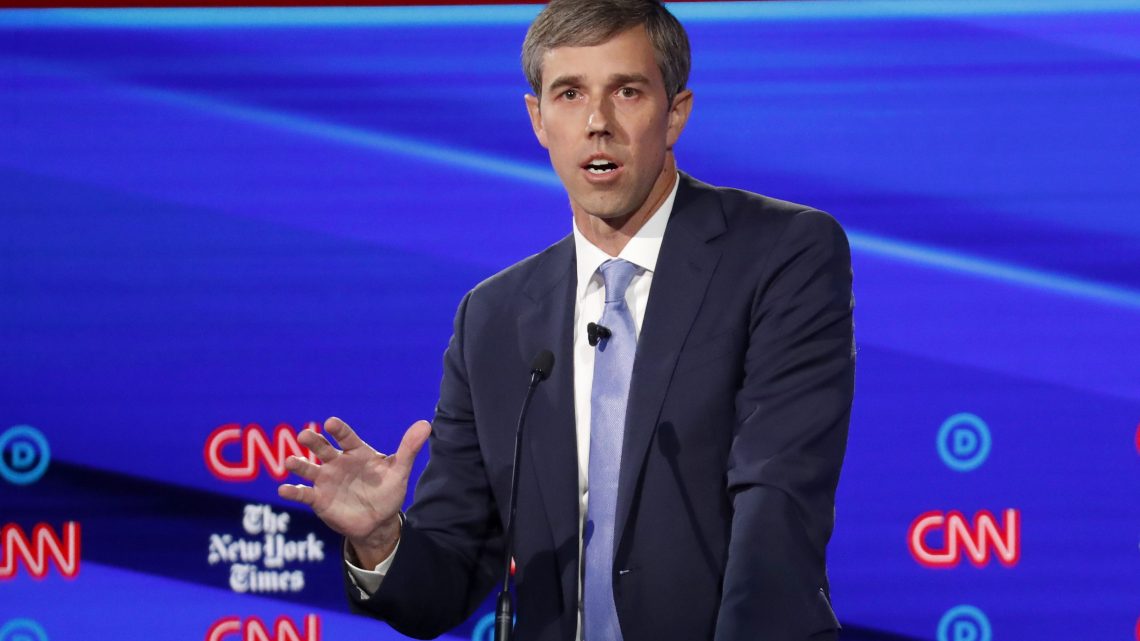
Beto O’Rourke Is Dropping Out
November 1, 2019Beto O’Rourke is dropping out of the 2020 race, ending a presidential campaign that never caught fire like his insurgent attempt to win a U.S. Senate seat from Texas last year.
"This is a campaign that has prided itself in seeing things clearly and on speaking honestly and on acting decisively," he told tearful supporters during an impromptu address on Friday evening. "We have to clearly see at this point that we do not have the means to pursue this campaign successfully, and that my service will not be as a candidate nor as the nominee of this party for the presidency."
O’Rourke added that he would work to help the eventual Democratic nominee to beat President Donald Trump, whom he listed as foremost among “the greatest set of challenges we’ve ever faced.”
“I also knew that the most fundamental of them is fear — the fear that Donald Trump wants us to feel about one another; the very real fear that too many in this country live under; and the fear we sometimes feel when it comes to doing the right thing, especially when it runs counter to what is politically convenient or popular,” O’Rourke wrote.
The news came as a shock to the dozens of O’Rourke supporters and staff gathered in a park outside of the Wells Fargo Arena in Des Moines, Iowa where O'Rourke was to speak at the Democrat's Liberty and Justice Celebration. Some volunteers sobbed while others consoled them under eight-foot letters spelling out YOU BETO BELIEVE IT.
Many had traveled from out of state to Iowa on their own dime to march into the arena with O’Rourke, and we’re confused by the timing of the candidate’s announcement.
O’Rourke’s campaign began with a bang and ended with a whimper. The ex-congressman raised a massive $6.1 million on his first day as a candidate, jumping into the race with great fanfare by focusing on his border-district credentials to rip Trump’s immigration policies. That was more than the $4.5 million he raised in the final three months of his race.
O’Rourke started the race with promise. He surged into third place in national polls by early April, hitting double digits in a number of surveys shortly after his mid-March campaign announcement. But he made an early tactical error by focusing on local events rather than TV coverage. That move, aimed at replicating his Texas Senate bid, failed in the presidential campaign because it took him out of the headlines early in the race.
Though he had some seasoned strategists working on his campaign, including some top alumni of President Obama’s network, he didn’t do much in the way of structural planning ahead of his bid for the presidency.
He was mocked unfairly for his habit of hopping onto tables and counters, and somewhat fairly for a dilettante-esque approach to the campaign, which included Medium posts that sometimes read like old MySpace journal entries.
O’Rourke was already fading by the time the presidential debates started in June — and failed mightily when squaring off against his other opponents. In the first round of presidential debates in late June, he was embarrassed by fellow Texan Julian Castro, who slammed him for a lack of knowledge on border policy specifics. That undercut one of his main campaign arguments.
O’Rourke got another look from the media and some voters with his response to the tragic massacre at a Walmart in his hometown of El Paso in August. His furious, raw, emotional response — blaming President Trump for inspiring the white supremacist who intentionally murdered many Hispanics, calling for a ban on all assault weapons — gave him new life.
O’Rourke essentially re-announced his campaign, promising to focus on the little guy and move from a heavy focus on early-state efforts to heading where crises and wrongs were being committed, like a massive immigration raid in Mississippi. But after a few weeks back in the spotlight, he began to fade once again.
He seemed to frame his campaign going forward on a winning issue, saying in a September ABC News debate “Hell, yes” when moderator David Muir asked if he would take people’s assault rifles away. “We’re going to take your AR-15, your AK-47. We’re not going to allow it to be used against our fellow Americans anymore,” he said.
But in a Democratic field where the other candidates also supported most gun control measures, that wasn’t enough to revive him — and it made some of the more moderate voters initially drawn to his campaign hesitant that he couldn’t appeal across party lines nationally, like he had in his Texas Senate bid.
As O’Rourke slipped, he was hurt by the rise of South Bend Mayor Pete Buttigieg, who went from a little-known candidate to one who’s currently at the front of the pack in Iowa polls. In O’Rourke’s final presidential debate, he tussled with Buttigieg over gun control but came out at best at a wash.
O’Rourke has sworn up and down that he won’t run for the Senate this year against Sen. John Cornyn (R-Texas) — and even if he does his newfound, more liberal stances on gun control and other issues would be a tough sell in his home state.
Democrats have a number of candidates running to face Cornyn including viral sensation M.J. Hegar, a military veteran with a large following from her 2018 House run.
But other candidates who swore they wouldn’t run for anything else have reneged on that guarantee, including former Colorado Gov. John Hickenlooper (D), who’s now running for the Senate. O’Rourke, who’d similarly pledged not to run for president during his 2018 campaign, might be pushed by some national Democrats to give a statewide race another look.
Daniel Newhauser contributed reporting.
Cover: Democratic presidential candidate former Texas Rep. Beto O'Rourke participates in a Democratic presidential primary debate hosted by CNN/New York Times at Otterbein University, Tuesday, Oct. 15, 2019, in Westerville, Ohio. (AP Photo/John Minchillo)


